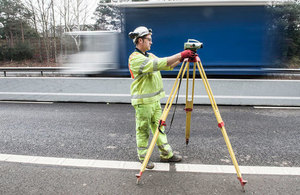Overnight workers keep the South East moving
As the clocks go back and the evenings draw in, South East road workers are backing an initiative to raise awareness about the amount of work carried out on the region’s roads overnight to deliver Highways England’s record £2.2 billion investment in the region.

To minimise disruption to drivers, around 90% of roadworks take place overnight in the region when roads are at their least busy. So while you might not always see them, hundreds of workers are out on the roads getting the job done when most of us are tucked up in bed.
A new YouTube video has also been released giving a behind the scenes look at the wide range of work that happens overnight in the region.
Night time working has its own set of challenges and safety is an important priority. BBMM’s Construction Team Leader Tom Simmons and Schemes Supervisor Christian Marks as well as HW Martin’s Traffic Management Supervisor Mark Day explain the pros and cons of working through the night.
Traffic management is the biggest and the most dangerous aspect of road work. It is important that drivers stick to the limit. When you have a 50 mph limit in place and vehicles are speeding past you significantly faster motorway roadworks can be a scary place to be. Mark explains that is not the only safety issue:
Night working is much safer due to lower traffic volumes for the installation and the removal of the traffic management but it still poses other hazards. Dealing with the public can be issue. Most are really nice but you do sometimes have to deal with people being aggressive. That is when you need to have a calm head.
The teams are very aware of how important it is to stick to timescales and that if a job runs over time this can have a major knock on effect and lead to people being delayed. Tom explains how the teams deal with this pressure:
There are really strong bonds between night time workers and most of the staff are dedicated night workers. The dedicated teams work longer hours so we are confident that works are completed on time.
Christian explains how working nights brings both positive and negative aspects to his life outside of work.
There are some advantages, like having the day at your disposal for the chores that life sometimes throws at you, but work gets in the way of – an appointment with the doctor, the bank, a tradesman or a delivery. The rest of the world lives and works days, so having the day off can be an advantage. Of course, these advantages can only be exploited at the considerable cost of interrupting your sleep which is the main down side of this job. If you think getting a good night’s sleep is difficult, try getting a good day’s sleep. Everything is working against us in this regard. The plumber next door, the kids, the postman, the phone, even the sun itself!
Mark agrees:
“I prefer night working as I can have an involvement at home with taking my children to school and also picking them up from school, I will see them more during the day when I work a night shift than if I work a full day shift. “
Larger projects amongst the night time work currently being carried out in this area include:
- Improving congestion at the A13/M25 junction 30
- Increasing capacity on the A21 between Tonbridge and Pembury
- Converting the M3 junctions 2 (M25) to 4a into a smart motorway
Highways England’s commitment to 24-hour working doesn’t end with roadworks. Its customer contact centre is staffed around the clock alongside the Traffic England website and Twitter feeds, which give drivers live traffic information when they need it.
Traffic officers also patrol motorways through the night – and are there to help deal with incidents and keep traffic moving. And the regional control centre, based at Godstone, has staff glued to CCTV screens through the day and night, including Christmas and New Year, helping to monitor traffic and manage incidents.
General enquiries
Members of the public should contact the Highways England customer contact centre on 0300 123 5000.
Media enquiries
Journalists should contact the Highways England press office on 0844 693 1448 and use the menu to speak to the most appropriate press officer.